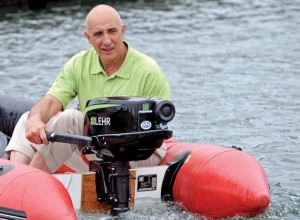 Our Product of the Week is a quiet, low-emission alternative for your dinghy’s engine, which won the 2012 National Marine Manufacturers Association Innovation Awards Ecological prize.
Our Product of the Week is a quiet, low-emission alternative for your dinghy’s engine, which won the 2012 National Marine Manufacturers Association Innovation Awards Ecological prize.
Brand new from a company named Lehr, the 2.5 and 5 hp models are powered not by normal fuel but by propane (LPG).
The brainchild of Capt. Bernardo Herzer, the company’s founder, they grew out of his desire to create a greener engine. Herzer started with gardening equipment and generators, so outboards were a natural outgrowth.
As Capt. Herzer explains, the ideas behind LEHR Incorporated were born during a series of long, cold nights spent converting gasoline engines to run on propane aboard the research vessel the Sea Surveyor at work in the North Sea.
Having already used propane to power small engines on several other ships in his years at sea, Captain Herzer knew he had something. ‘Propane is just safer, more efficient and more reliable,’ he says today, ‘that’s why we used it on our ships.’
Five years later, with corporate offices, and an R&D center at its ‘green’ headquarters in Los Angeles, California, LEHR is now a groundbreaking leader in the research and development of environmentally friendly technology.
The first generation of outboards includes a 2.5 and 5 hp four-stroke motor, in both 15- and 20-inch shaft lengths. Weighing just 52.8 pounds (long shaft), the 5 hp is the lightest outboard in its class, by a margin of up to 9.5 pounds. It’s a fairly conventional engine with a single cylinder with a 112cc displacement, which is the smallest in its class.
When propane is pressurized, it’s in a liquid state, which is more compact, but when the pressure is released it turns to vapor, which also makes it spill-proof. Even if it is vented into the atmosphere, it’s not a problem since it’s not classified as a greenhouse gas. Because propane is under pressure, Lehr outboards need a different fuel-delivery system that includes a special carburetor that doesn’t have a choke, so we were able to start it easily with one pull. A major plus is that propane doesn’t degrade with time, like gasoline or ethanol-laced gasohol, which has damaged many small motors throughout North America.
Propane for a Lehr can be stored in a regular 20-pound-capacity barbecue tank, but a better alternative is a fiberglass or composite tank, which only weighs around 12 pounds. You can even screw one of those 1-pound camping tanks right into a fitting in the engine’s cowling.
The Lehr outboard is very solidly built using high-grade metals such as stainless steel and bronze, and the fit and finish is good. Lehr produces its own engine block, so quality-control issues are within the company’s sphere of influence. Pricing is comparable to conventional outboards, and based on current gas/propane pricing and fuel efficiency, your fuel bill will likely be lower.
Lehr plans to build engines up to 175 hp, but the company started small in order to work out any issues.
by Sail-World Cruising